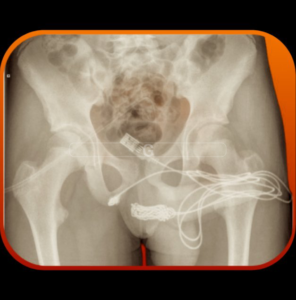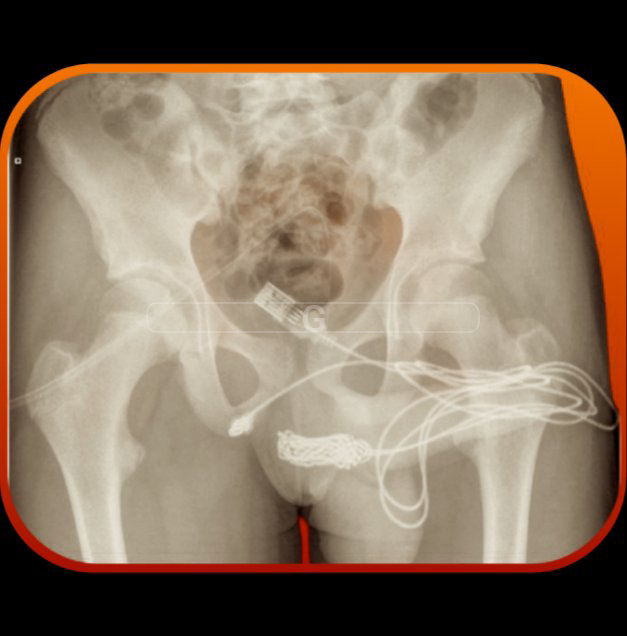Unusual Medical Incident
“Cable Cow”
The senses are a complex physical system that plays a vital role in maintaining a healthy life. But that being said, unexpected possibilities could also lead to significant and complicated issues. One of those distressing fitness situations is that of the dude who stimulated his hair, however, that still supplied a task to dental cleanings, highlighting the importance of fighting intellectual health problems.
 |
“Cable Cow” and the Habit of Self-Harm |
The beginning of the Incident
A dude went to the hospital whingeing that he had become unable to poop. His quandary led him to be skeptical, so he experienced intense pain in the abdomen. Upon iterative analysis, the fertility expert identified something unusual: an inexperienced-colored entity, matching a chain of posts or cables, bulging from his nipple. Whilst an attempt was made to extract it, the client yelled about a burning sensation, and we have been unable to describe what it changed into.
Diagnosis
Foreign Object in the Bladder
Given the stress of the situation, the dentists initiated an X-ray, and the study results surprised everyone. A long metal cable used to be found inside the patient’s bladder, with one final part projecting from his genitalia. It has been straightforward that the appearance of just this foreign object had already hindered the circulation of pee and had effectively blocked the bladder.
Emergency Surgery, 6 Meter Cable Removal
Realizing the potential danger to the patients’ lives, the dentists wanted to undertake emergency surgery. During the action, they excluded a 6-meter-long yellow plastic cable that was deposited in his bladder. It was an incredible and daunting method, leaving the surgical staff mystified as to why anyone would do such a thing.
Patient’s Confession and Mental State
After the action, the patient admitted that he had willfully inserted the cable into his build muscle for gratification and fulfillment. Even more explorations revealed that the customer suffered from mental health issues but had a strong desire toward self-harm and strange attitudes.
Pursuing this event, the dentists dubbed him “Cable Cow.”
Psychological evaluation
The addiction of Self-damage
This case serves as a critical exemplar for recognizing intellectually demanding situations. Consistent with therapists, the dependency of self-damage may additionally get up for the aforementioned purposes:
excellent desire for Sexual Gratification (Paraphilic behavior)
A few systems will try to seek happiness through unorthodox strategies that could then be toxic and deadly.
Mental Stress or Emotional Distress
Some people perpetrate actual harm on themselves to cope with mental stress or distress.
Mental Disorders
Conditions like obsessive-compulsive disorder (OCD) and other mental health issues can bring about intellectually dishonest and injurious habits.
Wanting Attention
Some humans resort to rare words and deeds to draw the attention of someone else toward themselves.
Medical Complications and Risks
Such actions can also cause serious injury and can also feel life-threatening.
The following complications can crop up from these behavior patterns:
Diseases such as hiv
The penetration of foreign material can transmit diseases in the urogenital area or rectum.
Inbuilt Injuries
Such devices can injure the vital body, requiring even more procedures or intricate therapeutic interventions.
Pouch Obstruction
A constriction in the abdomen can put even more pressure on the renal system and rectum, hopefully leading to kidney damage.
Decay of Mental Health
The diagnosis of certain doctors did require both physical and emotional precautions to minimize them from recurring such words and deeds.
Treatment and Rehabilitation Measures
For that kind of client, the operation itself is not adequate. Rebuilding mental health means it needs individuals and teams in rehab, meetings with therapists, and treatment options for intellectual well-being.
Psychotherapy
It helps the client know their behavior and handle stress.
Medication
If the individuals suffer from a psychological disorder, pills can assist in treatment.
Family Support
Concerning the patient’s near family is crucial to correctly get them out of such behavioral styles.
Cases like “Cable Cow” emphasize the complexity and uncertainty of the better intellect and the intensity of emotional disorders. This event is not a lot of a scientific narrative but a lecture that emphasizes the significance of caring for each psychiatric patient.
Why do users exhibit certain behaviors and attitudes, and how can they be prevented?
Understanding the Habit of Self-Harm
The descriptor “Cable Cow” can sometimes be used colloquially to describe individuals engaging in self-harming behavioral traits. This attitude can sometimes stem from emotional and psychological hurt, distress, tension, or traumatic experience. Self-harm is a serious matter, and understanding its main cause and figuring out a way to handle it is important.
Causes of Self-Harming Habits
Mental Stress and Anxiety
People under extreme psychological stress or anxiety may reshape their emotional anguish into pain as a means of finding brief respite.
Sense of Isolation or Inadequacy
Feelings of solitude, mentioned together with these indications of unemployment and underemployment, invariably lead an individual to utilize self-harming behaviors and attitudes.
Trauma or Abuse
Past life experiences of trauma, abuse, or ill treatment can lead to the development of self-harming habits.
Seeking Attention
Some humans use self-harm as a way to convey their anguish and garner attention or compassion or empathy from everyone.
Mental Health Disorders
Conditions like depression or psychiatric or mental illnesses might also bring on self-injury.
How to Help and Prevent Self-Harm
Build Connection and Trust
Establish trust and confer with them with empathy and understanding.
Seek Professional Help
Encourage recommending a psychologist or program coordinator to solve the profound main cause or provide medical, biological, and cognitive studies.
Offer Support
Help them arise outside of separation and find employment towards making great changes in their social lives.
Educate and Raise Awareness
Teach them that self-harm is hazardous and implement healthy outlets such as activity, photography, and perhaps other innovative news sources.
Spiritual Guidance
- Encourage traditional rites like Vipassana, comfort, and commemoration of God, and endeavors should be made in accord.
Provide Alternatives to Self-Harm
- Teach them healthier ways to express their feelings and emotions, too, such as composing, chatting to a best friend, or using deep-breathing approaches.
Develop an Emergency Plan
- If they display motivations of yet more self-harm, guarantee they have quick access to an emergency telephone or a collaborative platform.
Islamic Perspective
In Islam, self-harm is explicitly banned, as it indicates a blatant disregard for the existence of talent given by Allah.
The Quran indicates
“And do not kill yourselves. Surely, Allah is ever merciful to you.”
(Surah An-Nisa: 29)
Additionally, the Prophet Muhammad (PBUH) stated,
The phrase “Your body has a right over you” means that you should take care of your body because it is your responsibility. It reminds us to maintain a balance in life by giving our body proper rest, nutrition, exercise, and care. Overworking, forgetting health, or not taking note of our body’s well-being can endanger us, so this would go against the faith we are given to look after ourselves.
Conclusion
Self-harm is often an obvious sign of emotionally laden difficulties. And hence, you will need to confront infected people with empathy and understanding. Accept action solutions to help them or provide a hopeful, nurturing environment to inspire them in conquering their challenges and constructing a happier life.

Very good informative